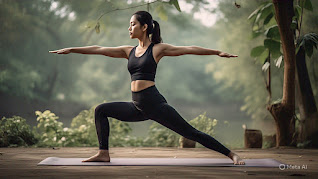Meditation is an ancient practice that has gained popularity
in recent years due to its numerous health benefits. It is a technique that
involves training the mind to focus on a single point of reference, such as the
breath or a mantra. The purpose of meditation is to achieve a state of inner
calm, relaxation, and mental clarity. If you're new to meditation and want to
get started, here is a beginner's guide to help you:
Find a quiet place: Choose a quiet spot in your home or
outdoors where you won't be disturbed. Turn off any distractions such as your
phone or television.
Sit comfortably: Sit in a comfortable position, such as
cross-legged on a cushion or chair, with your back straight and your hands
resting on your knees or in your lap.
Focus on your breath: Close your eyes and take a few deep
breaths to relax. Then, focus your attention on your breath as it moves in and
out of your body. Notice the sensation of the air moving in and out of your
nose or mouth.
Let your thoughts come and go: Your mind may start to wander
as you meditate. Don't worry about this, it's normal. Simply acknowledge your
thoughts and let them pass, returning your focus to your breath.
Start with short sessions: Start with just a few minutes of
meditation each day and gradually increase the time as you become more
comfortable with the practice.
Use guided meditations: If you're having trouble meditating
on your own, try using guided meditations. These are recordings that guide you
through the meditation process and can be found online or through apps.
Be patient: Meditation is a skill that takes time and
practice to develop. Don't expect to master it overnight, and don't get
discouraged if you find it difficult at first.
Make it a habit: Consistency is key when it comes to
meditation. Try to make it a daily habit, even if it's just for a few minutes
each day.
Experiment with different types of meditation: There are many different types of meditation, including mindfulness meditation, mantra meditation, and loving-kindness meditation. Experiment with different types to find the one that works best for you.
In conclusion, meditation is a simple yet powerful practice
that can have numerous benefits for your mental and physical health. With these
tips, you can get started on your meditation journey and begin to experience
the benefits for yourself. Remember, the most important thing is to be patient
and consistent in your practice.




